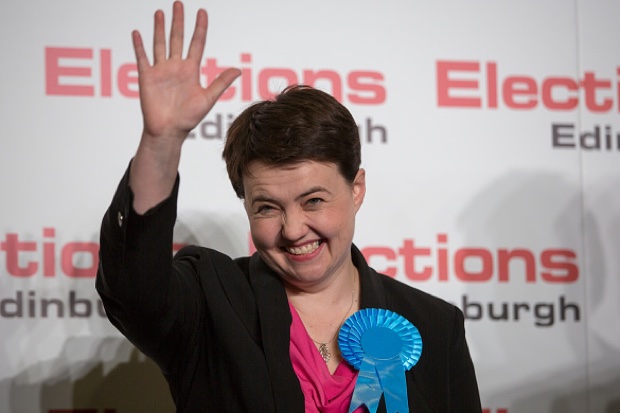The Tory achievement in Scotland was delightfully encapsulated in one sharp moment during the BBC’s overnight coverage. Jackson Carlaw, the Scottish Tory deputy leader, turned to Alex Salmond, pointed his finger and said: “Alex Salmond said we deserved to stay in purdah, well, we are not in purdah any more.”
That retort summed up the frustration built up over decades of defeat and put-downs from the SNP and Labour. Mr Carlaw’s message was simple: the Tories are back in Scotland.
In many ways, he was right. Remember the 1997 wipe-out? The election when the electorate came together to kick out every Tory MP in Scotland? Now the party is the official opposition in Scotland. It is forecast to get 31 seats to Labour’s 24, it was on course to beat Labour in votes and seats north of the border for the first time in 60 years.
Partly this is down to Ruth Davidson. The campaign focused on her to the exclusion of almost everything else, including the Conservative brand. She is young, feisty and popular – and how often can that have been said of a Scottish Tory?
Partly it was down to her concentrating on the constitution, which is still the major fault-line in Scottish politics. But partly, also, it was down to Labour’s dismal, disastrous election campaign. Labour was squeezed out on the Left by the SNP and squeezed out on the constitution by the Tories.
The most significant effect of the Tory result in Scotland, however, may be to squash, once and for all, the notion that Scotland is a completely, fundamentally, overwhelmingly left-wing country.
The Conservative brand is one that has been deemed to be ‘toxic’ for the last two decades: but no longer. Becoming the official opposition at Holyrood should, at last, dispel that myth and now that people feel they can vote Tory and not hide that fact, the party can only grow.
The SNP win – combined with the Tory second place – will keep the constitution front and centre in Scottish politics for some time to come. But Nicola Sturgeon’s failure to win a majority will severely hamper her chances of calling another Scottish independence referendum.
To get that through Holyrood, she will need the support of the pro-independence Greens. Crucially, that will take the issue out of her control. It had been widely assumed before the election that Scotland was about to have a re-run of 2011 when Alex Salmond romped home with an unprecedented majority, giving him the chance to call the referendum on independence.
Instead, it appears as if we are actually back to 2007, when Mr Salmond won his first election for the SNP, but had to run a minority government with the support of others. Mr Salmond wasn’t confident enough to try for a referendum then, because he did not have a majority, and the same is likely to be the case now for Ms Sturgeon.
One final thought, though, is that this does represent a bittersweet moment for Ms Sturgeon. She has her mandate, at last, to be the First Minister of Scotland elected by the people. She will be delighted with that. But, at the back of her mind is the uncomfortable reality that she failed to do as well as her predecessor.
There will be questions: if the SNP could not win a majority now, when it commands 50 per cent of public support in the country, then when can it? Indeed, Salmond’s achievement of winning a majority in an electoral system designed to prevent exactly that is likely to remain outstanding, possibly for a long, long time to come: something, one suspects, that Mr Salmond may never tire of reminding us of.






Comments